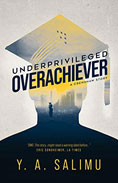
 |
Yohancé Salimu is a man with a never-ending personality. In his memoir, he fondly explains the pronunciation of his first name by saying it rhymes with Beyoncé. Nonetheless, what seamlessly brings together the charisma and confidence is a relentless desire to get better, to be bigger than the challenges that circumstances have thrown his way. This memoir traverses his childhood journey, leading up to his graduation at Crenshaw High and the eventual next phase of his life at the U.S. Air Force Academy (USAFA). Though there needs to be a disclaimer for profanity in the book, it is within the scope of standard vernacular and fits right into the casual, conversational style of the author. Written with such authenticity, Salimu's energy is infectious and further accentuates the magnitude of the mountain climbed to get to his successes.
For much of his childhood, Salimu, one of eighteen siblings (though only five grew up with him and his mother), was focused on hunger and bouncing around shelters on Skid Row. In his own words, his father "was more of a lifeline than a provider." When gangs and drugs beckoned in his younger years, falling into the wrong crowd would have been the easy thing for him to do. However, one particular event will surely resonate with audiences. A trip to the park with his younger sibling, Kumasi, had multiple purposes. First, there would be free food. For a growing child, unlimited free food when food is not always readily available is impossible to turn down. More importantly, though, The Rock was going to come in person to screen his film, Gridiron Gang, and talk about inner-city life. Conjure the image of a child anticipating a larger-than-life personality who walked a similar path. Although Salimu had little hope that the famous wrestler-turned-actor would actually show up, The Rock's arrival and subsequent talk was a turning point in terms of a "hell or high water" mentality.
Whether it is a 2006 encounter with the Bloods at the ice cream truck or being chased for simply asking what's for dinner, numerous scenes highlight the chaotic nature of Salimu's childhood. None, however, may be as downright harrowing and traumatizing as being raped by a transgender woman. Digging deeper, the author reflects on the moment he recognizes how society perceives him, including preconceived notions on his size and strength as well as the latent racial tension. Despite living in homelessness, Salimu doubles down on his commitment to education as his ticket out of suffering. Simultaneously haunting and beautiful is how Salimu processes the different interactions he experiences. Connecting with Sarah became his roadmap to the piano, while his conversations with Timothy, a fellow bus rider and friend, became a window to fulfillment and genuine happiness. With each experience, from football and piano to robotics and track, Salimu transforms from a man driven by his love for fights into a man of character and conviction. He becomes the epitome of persistence by listening to his strong inner voice, a moral compass that provides him with exit opportunities when potential trouble is looming.
Salimu's memoir is as much about his conquering of fear as it is a beacon of light for others to follow on their own road to self-improvement. More than anything else, the author's conversation with Timothy yields a mantra that is established time and time again: stop comparing yourself to everyone else. Additionally, Salimu successfully builds a support system predicated upon a genuine display of passion and communication. The result is earning the confidence of key figures in his life, such as his varsity football coach, his robotics advisor, Tim Wright, and Dr. Ramsay. When the going gets especially tough, the piano becomes his therapeutic outlet. Needless to say, the author's journey from Crenshaw to USAFA has been rife with challenges that would bring anyone to their knees, and no one would blame him for it. Instead, he's channeled his experiences into an uplifting, well-flowing, and fiercely original narrative that harbors the potential to be a game-changer in the realm of changing attitudes and perspectives.
Honorable Mention in the 2021 Eric Hoffer Book Award Memoir Category
RECOMMENDED by the US Review